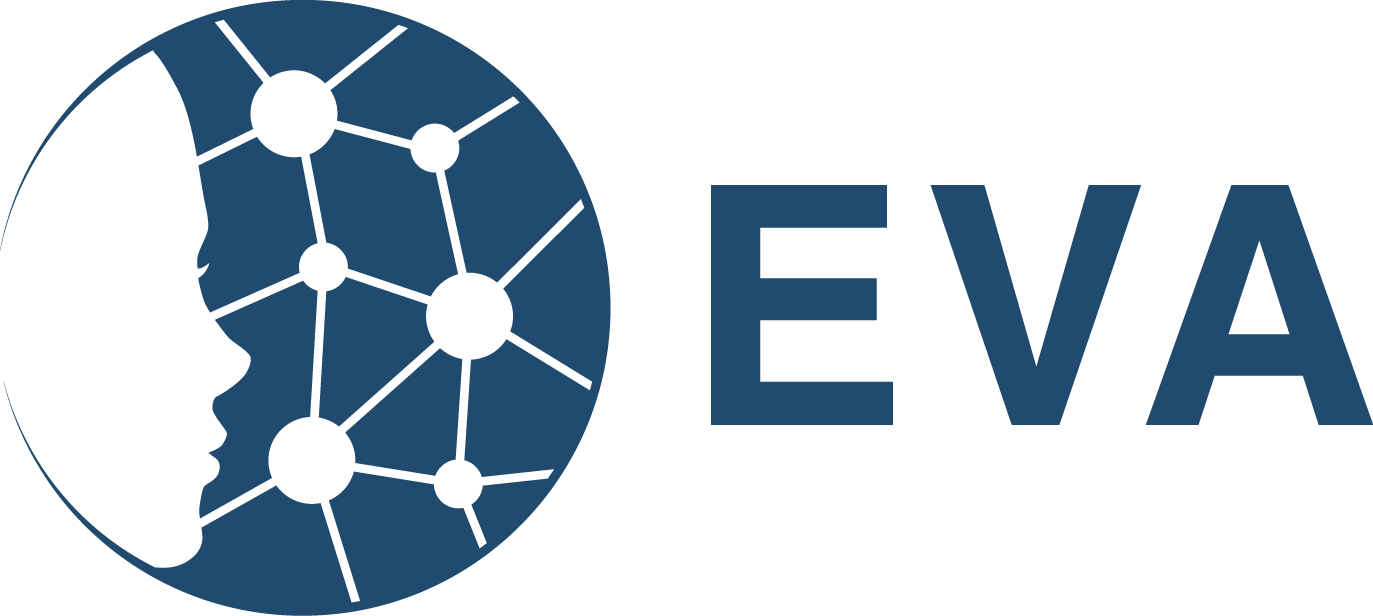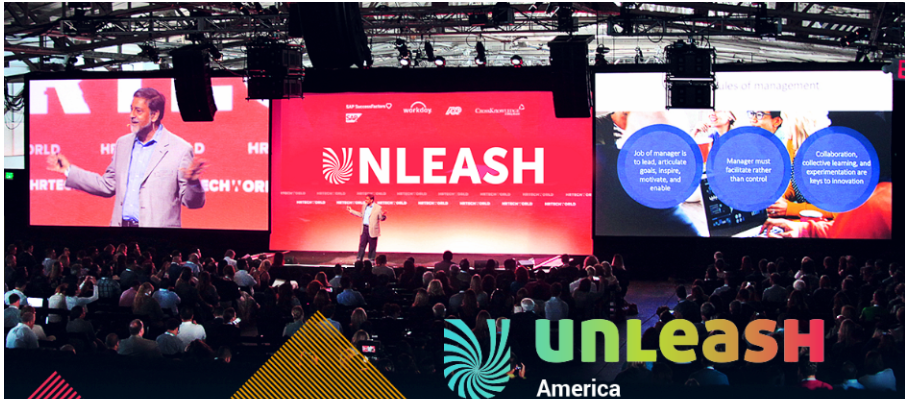
UNLEASH AMERICA 2019
Following our 2019 UK Start-Up of the year win – EVA.ai team attended Unleash America, which was on May 14-15 in Las Vegas. This year’s theme was “The Bridge Between Work and Technology” – although Unleash is focused on HR tech, the conference also features wide review and discussions on key trends and issues at the forefront of the industry. This year's focus was on data privacy and the EU’s General Data Protection Regulation which is being reviewed by the US Congress as a potential template for a renewed effort on protecting people’s data. Perhaps the biggest topic occupying many industry experts will concern the advent of Automation and AI, the conference event focuses on the future of HR and it is widely recognized that those new technologies are the most important disrupting factors the industry has seen in over 50 years.
HOW AUTOMATION HAS IMPACTED OTHER INDUSTRIES
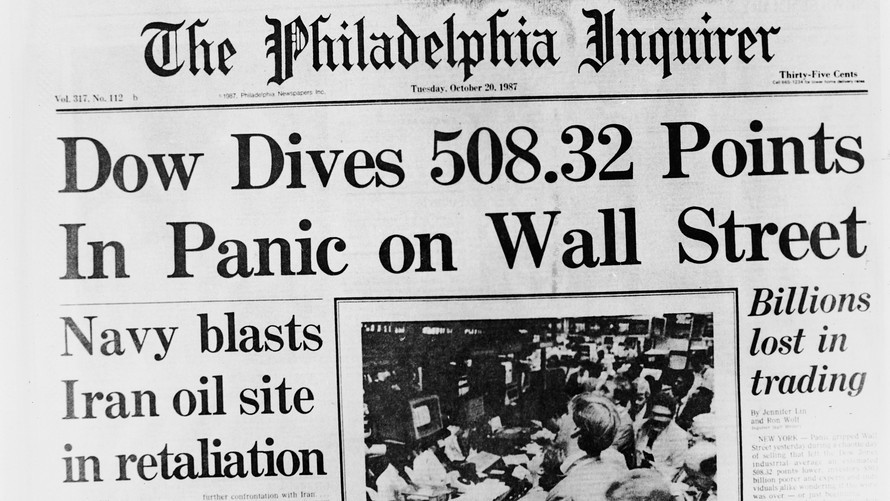
The banking sector, as much as the finance sector, overall has seen some of the largest shifts due to technology in the past 15 years. In fact, the “take-over” of technology over people started on October 19th 1987, when, from one moment to the next, the value of the entire U.S. stock market fell by 22.61 percent. During the “crash” some wall street brokers declined to pick up their phones to avoid taking orders from their customers to sell stocks. . It wasn’t the first time Wall Street professionals had discredited themselves, but this time the authorities responded by changing the rules – they made it a lot easier for computers to do the job done by people. This 1987 event set in motion a series of decisions that ultimately ended with computers completely replacing people in some areas of finance.
The finance industry is now run in black boxes in maximum security locations across the world in “data-farms” in heavily guarded buildings in Chicago, Shanghai and London. What goes on in those boxes is what is happening in the Bank industry today.
Anthony Jenkins, former Chief executive of Barclays joined the Bank of England’s chief economist, Citigroup’s investment chief and other leading bankers in predicting customer services, middle and back office roles – making up 50% of all jobs in the sector – are all in line to be replaced entirely by computers. The finance sector has seen and will continue to see a reduction in the number of branches as well as a reduction in the number of people employed in the industry. More importantly, there has been a tectonic shift in roles; those such as “High-Frequency Trading Programmer” are now in high demand, the traditional means of finding these rare-skill sets and expertise people have also gone through a drastic change.
32% INCREASE IN PRODUCTIVITY
Traditionally, recruiting talent for the Banking and Finance industry relied on sourcing the graduates from Ivy League schools and specific academic programs, but a recent example from HSBC Apac upended that traditional assumption and approach. Using a combination of qualitative and quantitative data garnered across over 30-branches and over 10,000 employees in the region, the company managed to map all the data points collected across five categories: Demographics, branch information, employees performance, employees professional history and tenure. Analytics uncovered common tasks amongst low performing employees, team structures and branch internal communication processes. The bank then proceeded to use machines and programs to automate most of those identified tasks. This resulted in a 32% increase in productivity and a net income rising by 16%.

Bank of England’s chief economist Andy Haldane dubbed this coming wave the “Fourth Industrial Revolution” of technological change, he predicted this would lead to a “hollowing” out of the job market and the potential rising of inequality, social tension and many people entering “technological” poverty. Citigroup’s investment bank president Jamie Foresee told the Financial Times that the bank would shed up to half of its technology and investment staff in the next five years, with Sales and Research being the key areas in which the banks continue to hire people.
AUTOMATION IS CREATING NEW JOBS
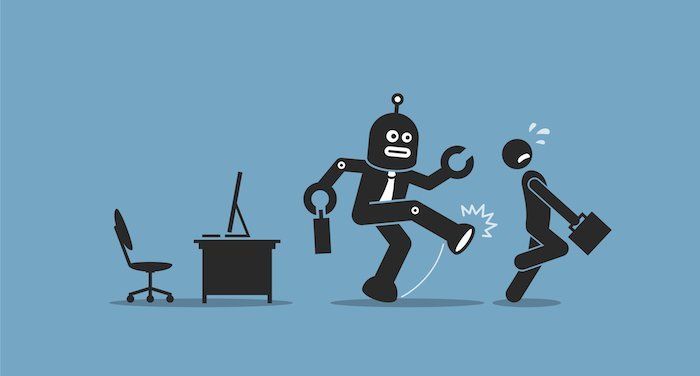
Back in 2013 Oxford University researchers Frey and Osborne projected the US would lose 47% of its jobs to Automation. Many people were alarmed by this, imagining Elon Musks vision of a world dominated by robots about to come true.
IN 1900, 40% OF ALL US EMPLOYMENT IS IN AGRICULTURE
Some experts tried to nuance this view by shoring up the prospects of new jobs created as a result of Automation and Artificial intelligence – David AUTOR (MIT, Economist) remarked: “Let’s do a thought exercise, it’s the year 1900, 40% of all US employment is in agriculture…an economist teleports back in time and says 100 years from now only 2% of people will be working in agriculture.. what do you think the other 38% of people will do?...” he ascertains none of them could possibly imagine jobs such as Search Engine Optimization, Health & Wellness or software developer, mobile devices, etc. Most of the jobs of today barely existed or could be imagined.
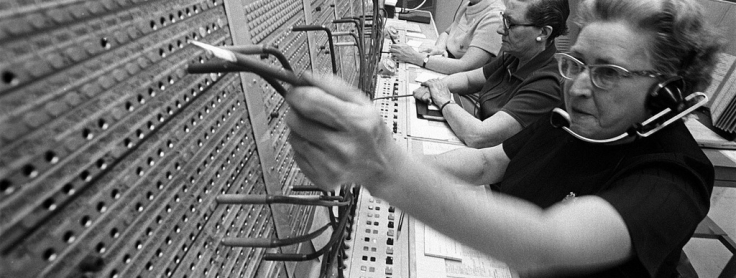 An example of the impact of technology on job role creation can be seen in the early 1990s when voice recognition technology improved and phone company operators were justifiably worried for their jobs. However the popularity of online call centres began to skyrocket and provide support in a whole host of different industries, thereby increasing employment.
An example of the impact of technology on job role creation can be seen in the early 1990s when voice recognition technology improved and phone company operators were justifiably worried for their jobs. However the popularity of online call centres began to skyrocket and provide support in a whole host of different industries, thereby increasing employment.
The HR industry is not exempt from this phenomenon although 16% of HR jobs are expected to be replaced (source: RI magazine 2018) – there is a consensus that Talent Acquisition will be where AI and Automation will have the biggest impact.

China GORMAN (Managing Director of Unleash US operations : ”Talent Acquisition, I think is going to lead the rest of HR in terms of effective use of AI..” – it is already the case AI programs are already replacing human recruiters at initial job interviews for some major corporations such as Apple, Coinbase, Ikea or Amazon.
The 2018 Future of Jobs report by the World Economic Forum provides compelling evidence on how Ai and Automation are accelerating the transformation of Talent Acquisition. According to the report over 50% of the businesses surveyed expected automation to have an impact on how they manage their talent acquisition.
EVA.ai ANALYSIS OF AUTOMATION & AI FOR TALENT ACQUISITION
We at EVA.ai believe Automation and AI presents an opportunity for HR Professionals, and more specifically for modern data-driven Talent Acquisition approaches. Our technology enables the automation of processes such as CV screening, whilst increasing both effectiveness and productivity through a blend of AI and humans. In so doing we are disrupting the HR tech industry approach which has been primarily focused on automating (quickening) tasks, non-supervised Machine Learning (i.e. two methods referred to as temporal-difference learning – TDL – and Reinforcement Learning – RL). Those approaches proceed without human input or contextual understanding. We at EVA.ai strongly believe Automation and AI must be human-centered and infused with a flexible-learning human capability (what we call “Supervised Machine Learning”). When used correctly, AI and Automation can help reduce or eliminate bias, improve the candidate experience, decrease time to hire, help find the best-fit candidates faster, and lower future turnover as well as cost-to-hire.
AUTOMATION AND AI MUST BE HUMAN-CENTERED
Employees and candidates also agree and are on the side of those new technologies – in 2017 Randstad published a report which showed 91% of US job candidates said they believed technology, AI included, has made applying for jobs more efficient. Respondents also said they felt more respected and engaged in the recruitment process after receiving automated updates.
From the recruiters’ side, there is less fear and higher expectations set on how this new technology might make their jobs easier and more rewarding

– Olie Kriling Recruiter for Annapurna Recruitment Agency :”Technology such as AI and Automation cannot do what I do, recognize and connect with the human emotion of a candidate, there are plenty of things I would like the machine to do – it’s high time machines helped us manage the ever increasing amount of information and data we need to process to find the best-fit candidates…”.
We believe HR and Talent Acquisition must strike the right balance between using technology to increase people’s productivity and help people create more meaningful relationships. We at EVA.ai have a mission, our mission is to help great people connect and meet great companies for meaningful jobs and careers; We believe the best way to achieve this mission is by ensuring the right integration of machines and humans.
